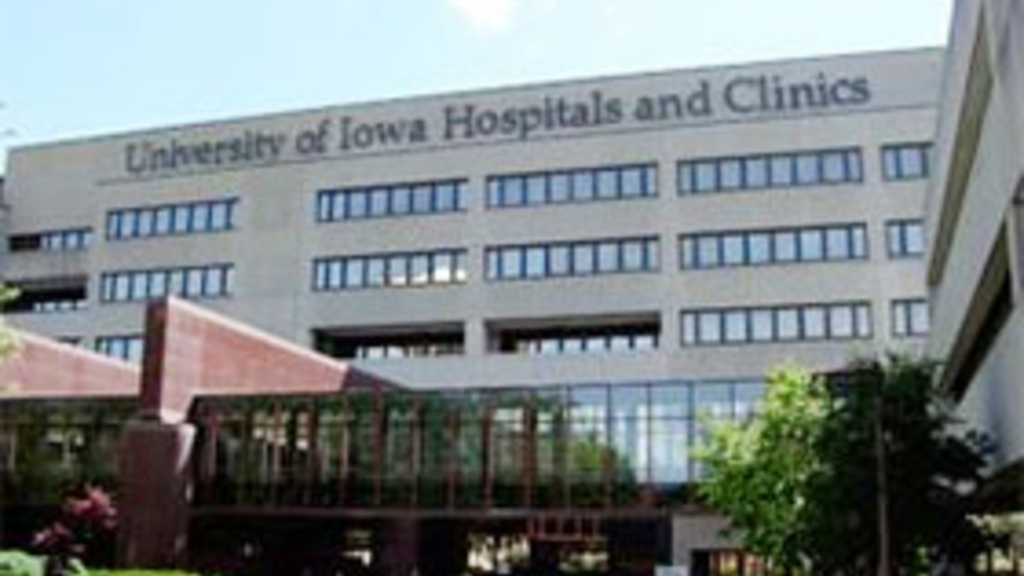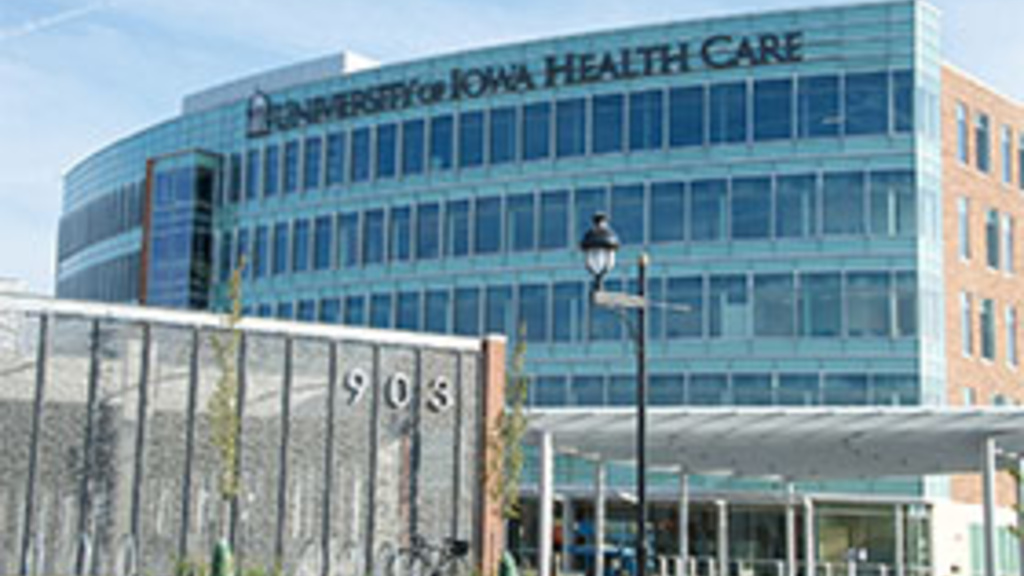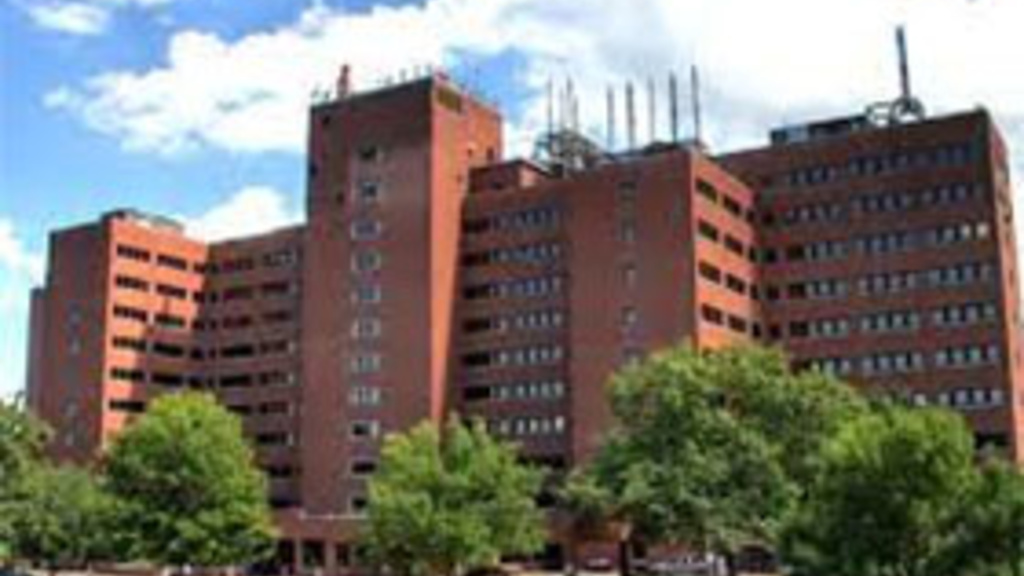Endocrinology, Diabetes, and Metabolism Fellowship
About the Program
Main navigation
The Division of Endocrinology and Metabolism of the Department of Internal Medicine at The University of Iowa offers an instructional program for qualified individuals desiring advanced training in academic and clinical endocrinology. We offer 2-year clinical fellowship training and 3-year research fellowship training.
Qualifications for candidates include:
- MD degree (or equivalent)
- Successful completion or expected completion of three years of residency training in Internal Medicine, with Board Eligibility or Certification by the American Board of Internal Medicine, by the initiation of Endocrinology Fellowship training.
Our training program in Endocrinology, Diabetes, and Metabolism is designed to provide advanced training and experience for the trainee to acquire the knowledge, skills, attitudes, and experience required for all of the competencies needed by an endocrinologist. Our program fulfills trainee needs, whether their future career plans lead them to clinical practice, endocrine research, clinical education, or some combination of all three. Suitably qualified fellows may also undertake a program leading to a Certificate, Masters, or PhD degree in Translational Biomedicine or Medical Education during their tenure.
Mission Statement
Our mission as an endocrinology program is to develop academic leaders who will advance endocrinology research and practice, and train endocrinologists who will provide the highest quality care to patients with endocrine disorders in all health care settings.
Program Aims
Our program aims to:
- Support trainees in becoming lifelong learners, committed to self-reflection, self-assessment, and improvement
- Engage trainees in methods of individualized learning that will improve critical thinking and clinical skills regardless of future career path
- Deliver a core curriculum and clinical experiences that teach basic and advanced endocrine biochemistry, physiology and pathophysiology, providing the basis for understanding, preventing and treating endocrine disorders
- Provide clinical experiences that allow trainees to deliver cost effective team-based care that respects patient values and preferences
- Support trainees in developing the necessary skills and knowledge used in the areas of teaching, quality and safety, and scholarship
- Provide opportunities and flexibility supporting individualized career plans
- Foster a learning environment that promotes progressive responsibility and graduated autonomy
- Maintain a culture of wellness that emphasizes self-care, peer support, camaraderie, and mentorship
- Maintain a learning environment that fosters professionalism, including interactions with peers and other health care providers, communication with patients and families, confidentiality, and avoidance of conflict of interest
Goals and Objectives
Our goals as an endocrinology program are the development of academic leaders who will advance endocrinology research and practice, and to train endocrinologists who will provide the highest quality care to patients with endocrine disorders in all health care settings.
General Objectives
The program will provide training in:
- Endocrine biochemistry, physiology and pathophysiology
- Diagnosis and management of endocrine diseases including:
- History and physical examination for endocrine disorders
- Selection and interpretation of endocrine biochemical tests
- Selection and interpretation of imaging procedures
- Understanding pharmacotherapy for endocrine disorders and appropriate use of surgery, radiation therapy, treatment with radioisotopes, etc.
- Procedural and technical skills, including ultrasound assessment of the thyroid, ultrasound guided fine needle aspiration of the thyroid, interpretation of bone densitometry, and the use of insulin pumps and continuous glucose monitoring systems (CGMS)
- Professionalism, including peer interactions, communication with patients, their families and other health care providers, confidentiality and avoidance of conflict of interest
- Endocrine-related scholarship:
- Quality improvement and patient safety research
- Evidence-based clinical practice, which includes selection of high-quality publications and interpretation of strengths and weaknesses of published literature
- Research and scholarship development, with specific goals of presenting at national/international meetings and publishing original work
- Lifelong learning and professional development
Rotation-Specific Objectives
Clinical Consult Services
- Evaluate and treat endocrine urgencies and emergencies
- Evaluate and treat non-urgent endocrine disorders in hospitalized patients
- Manage diabetes in hospitalized patients, including critically ill medical and surgical patients
- Gain on-call experience covering in-patient units and outpatient urgent calls
- Function as part of multidisciplinary care teams
Outpatient Clinical Experiences
- Evaluate and treat ambulatory acute and chronic endocrine disorders
- Evaluate and treat diabetes in ambulatory patients, including the use of insulin pumps and CGMS
- Provide long-term follow up for patients with chronic endocrine disorders
- Interpret thyroid ultrasounds
- Perform fine needle aspiration of thyroid nodules
- Interpret DXA scans
- Function as part of multidisciplinary care teams
Research/Scholarship Experiences
- Engage in methods of individualized learning that will improve critical thinking and clinical skills regardless of future career path
- Explore opportunities in basic research, clinical research, and/or other forms of scholarship
- Develop a research project to answer a specific question in endocrinology with the goal to produce a scholarly presentation or article for publication
Message from the Program Director
Message from the Endocrine Division Chair
Fellows as Clinician Educators Program (FACE)
For future clinician-educators.
Internal Medicine Fellows' Conference
Common curriculum for fellows in all divisions of the Department.
Training Programs
The Fellowship in Endocrinology, Diabetes, and Metabolism at the University of Iowa provides trainees with the education and experience required to function as competent specialists, educators, and scientists. Fellows are involved in a variety of clinical and scholarly activities to guide their training. The curriculum and evaluations incorporate the competency tenets of the American Council for Graduate Medical Education (ACGME): medical knowledge, patient care, practice-based learning and improvement, systems-based practice, professionalism, and interpersonal and communication skills.
Clinical Training
Clinical training involves inpatient endocrinology consult rotations, general endocrinology and diabetes continuity of care (COC) clinics, and additional subspecialty clinics to supplement the COC experience. These subspecialty clinics take place within the Division of Endocrinology or through other divisions and departments, including:
- High Risk Obstetrics
- Lipid Clinics
- Male Infertility Clinics
- Reproductive Endocrinology Clinics
- Metabolic Bone Disease Clinics
- Obesity Clinic
- Thyroid US and FNA Clinics
- Neuroendocrine Tumor Clinics
- Pediatric Endocrinology Clinics
- Renal Stone Clinics
Didactics
Several didactic sessions are offered every week. These aim to present the fellows with knowledge related to endocrinology and to teach them how to prepare and deliver their own presentations.
Weekly Frontiers in Diabetes, Obesity, and Metabolism Seminar
Presented by basic and clinical researchers with expertise in the fields of obesity, diabetes, and the metabolic syndrome.
Weekly Fellow Didactic Curriculum Lecture Series
Covers core endocrine topics presented by endocrinology faculty members and members of other departments and divisions. Topics discussed include basic endocrine physiology and pathology, clinical endocrinology, nutrition, and endocrine testing.
Weekly Clinical Case Discussions
Fellows present a variety of cases on a rotating basis. Following each case presentation, the presenting fellow leads a discussion among the other fellows, faculty, and any residents and students currently rotating on the service.
Monthly Endocrine Journal Club
Presented by the fellows on a rotating basis with faculty mentorship.
Weekly Endocrine Grand Rounds
Presented by endocrine faculty and fellows on a rotating basis, faculty from other divisions and departments, and visiting professors. Fellows are mentored by a faculty member who assists them with topic selection and preparation of the presentation.
Biweekly Tumor Board
Attended by endocrine staff and fellows, surgical oncologists, otolaryngologists involved in thyroid and parathyroid surgery, radiologists and pathologists. During these sessions, patients with endocrine malignancies are reviewed and discussed, and treatment recommendations are formulated.
Weekly Interdisciplinary Fellowship Conference
Lectures are organized by the core Internal Medicine residency program for all Internal Medicine fellows from all specialties. They include discussions of core topics required by ACGME, additional topics of interest to the fellows, and informal discussions with the department chair.
Monthly Fellow Advancement Conference
On a rotating basis, this conference covers topics related to business, communication skills, and wellness.
Procedural Training
Procedural training will lead to demonstrated excellence in a variety of procedures, including those required by ACGME and ABIM:
- Insulin pumps
- Continuous glucose monitoring systems (CGMS)
- Dual-energy X-ray absorptiometry (DXA)
- Thyroid ultrasound
- Ultrasound-guided fine needle aspiration
Quality Improvement Training
All fellows participate in quality improvement training. All fellows complete a series of online QI modules, leading to a certificate in quality improvement. In addition, clinical fellows complete a QI project under mentor supervision and are expected to present results from their projects at local, regional or national meetings.
Winners of ENDO19 and ENDO20 Abstract Awards
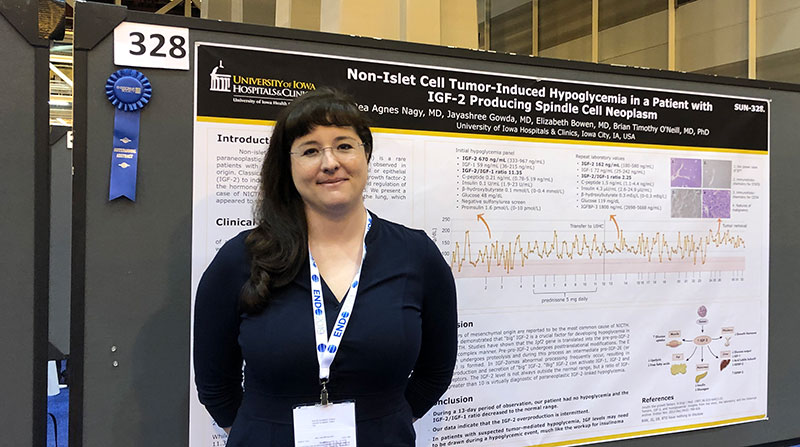
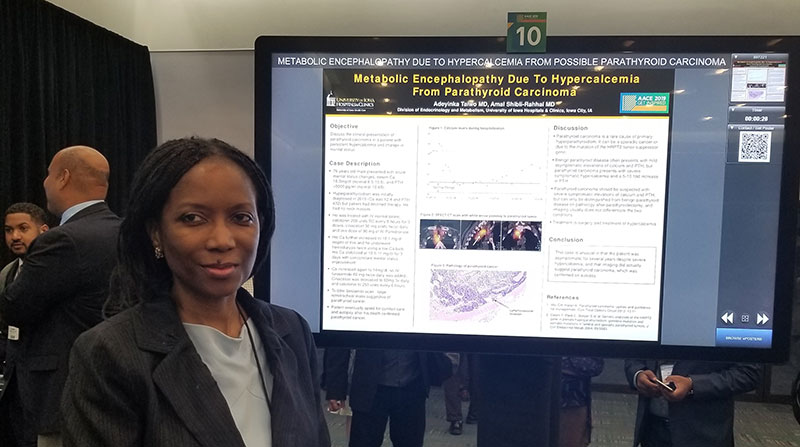
Research Training and Scholarship
All fellows are required to participate in scholarship, but the requirements vary between clinical and research fellows.
Research Fellowships
Research fellowships are three years long, with a major emphasis on basic, translational, or clinical research training. Under close mentorship, research fellows participate in a rigorous and well-defined program that will prepare them for a career in academic research. The successful research fellow will write grant proposals in pursuit of funding, present their research at local, regional, and national meetings, and prepare and publish original research papers. The research program that the fellow participates in will be relevant to endocrinology and metabolism and can be based in the Division of Endocrinology or in other departments or divisions.
Clinical Fellowships
Clinical fellowships are two or three years long, preparing the fellow for a career as a clinician. Clinical fellows are not required to conduct formal research, but are still expected to participate in scholarly activities. These scholarly activities are more broadly defined and can encompass basic or clinical research, outcome research, literature reviews, description of novel clinical findings in case reports and series, and development and assessment of rigorous practice improvement protocols. The fellow will carry out the scholarly activity with the goal of publishing at least one manuscript in a peer-reviewed journal or presenting at a national professional meeting.
The Fraternal Order of Eagles Diabetes Research Center has received a $2.02M T32 grant.
Yearly Curricula
All fellows receive the same clinical training during the first year of fellowship. After the first year, training is tailored to the needs and career goals of each fellow.
Fellowship Year One
For all fellows, the first year of fellowship is structured as follows:
- Three UI Health Care continuity of care (COC) clinics per week throughout the year (except when on UI Health Care or VA consult service). Endocrine COC clinics encompass endocrine and diabetes.
- One VA general endocrinology clinic per week when not on any consult service. Two clinics per week when on VA consult service, and none when on UI Health Care consult service. These clinics are run on a COC model and encompass a mix of general endocrine disorders and diabetes.
- Approximately 4 months on UI Health Care consult service (covers both UI Health Care and VA inpatient and urgent outpatient consults).
- Approximately 3 months of VA consult service (covers inpatient and urgent outpatient consults).
Sub-specialty clinics intended to complement training provided through the endocrine consult service and the fellow COC clinics. The majority of these experiences will likely take place in year 1. Fellows may complete some of these requirements in year 2.
Rotation Requirement High-risk OB Under close mentorship, each fellow follows 6 pregnant patients:
2 with type I DM
2 with type 2 DM
2 with gestational diabetesLipid clinic 4 half-day clinics Male infertility clinic 2 half-day clinics Pediatric endocrinology 6 half-day clinics Renal stone 2 half-day clinics Reproductive endocrinology 3 half-day clinics NETC 5 half-day clinics Bone 5 half-day clinics Radiology US (thyroid US and FNA) 6 half-day clinics Obesity Clinic 6 half-day clinics Thyroid FNA clinic Every other Monday (fellows rotate) LGBT clinic 4 half-day clinics
All fellows are also required to work on QI training, general scholarship, and to participate in the division’s didactics.
In addition, during year one, research fellows will identify a research project and mentor, obtain any required research certifications (such as human subject training), and familiarize themselves with their chosen research area, including learning any necessary basic procedures and techniques.
Sample Yearly Schedule
Each week in the table below shows the fellows’ clinical and didactic schedule depending on whether they are assigned to UI Health Care consult service, VA consult service, or no consult service.
The fellow on UI Health Care consult service is on call one of the weekend days and the second weekend day rotates among the other fellow physicians.
| Monday | Tuesday | Wednesday | Thursday | Friday | |
|---|---|---|---|---|---|
| No Consult | 13:00 Frontiers 14:00 Didactic 16:00 Case Conf/JC | COC: AM COC: PM | COC: AM | 12:00 Int Med Grand Rds 13:00 Common Fellows Curric 17:00 Tumor Board (every other week) | 7:30 Endo Grand Rds VA Clinic: AM 13:30 Fellow Dev Series (once a month) |
| UI Health Care Consult | Consults: All day 13:00 Frontiers 14:00 Didactic 16:00 Case Conf/JC | Consults: All day | Consults: All day | Consults: All day 12:00 Int Med Grand Rds 13:00 Common Fellows Curric 17:00 Tumor Board (every other week) | Consults: All day 7:30 Endo Grand Rds 13:30 Fellow Dev Series (once a month) |
| VA Consult | Consults: All day 13:00 Frontiers 14:00 Didactic 16:00 Case Conf/JC | Consults: All day | Consults: All day | Consults: All day 12:00 Int Med Grand Rds 13:00 Common Fellows Curric 17:00 Tumor Board (every other week) | Consults: All day VA Clinic: AM 7:30 Endo Grand Rds 13:30 Fellow Dev Series (once a month) |
Fellows focused on a career in community practice will pursue a fully clinical two-year training program with opportunities to pursue practice-based or systems-based initiatives. While most clinical fellows participate in a two-year training program, fellows interested in a specific subspecialty or in medical education may spend an additional year in training, after consultation with the program director, division faculty, and the institutional graduate medical education officials. For such fellows, pursuit of a Masters or Certificate degree in Medical Education is a good complement to their training. Extension of training is subject to the fellow’s visa or US residency status.
Fellows focused on an academic career will pursue a three-year program strongly focused on research. They generally initiate their laboratory or clinical research training during their first year and spend the majority of their second and third years performing their research.
For Clinical Fellows
Fellowship Year Two
For Clinical Fellows:
- Three University of Iowa Health Care continuity of care (COC) clinics per week throughout the year (except when on consult service). Endocrine COC clinics encompass endocrine and diabetes.
- One VA general endocrinology clinic per week when not on any consult service. Two clinics per week when on VA consult service, and none when on UI Health Care consult service. These clinics are run on a COC model and encompass a mix of general endocrine disorders and diabetes.
- Approximately two months of UI Health Care consult service
- Approximately three months of VA consult service
- Sub-specialty clinics, if these were not completed in year one
- Thyroid FNA Clinic
- In consultation with faculty and program director, attend further specialty clinics to improve experience in any clinical area within endocrinology. These “elective” clinics will be aligned with the fellow’s long-term training and career goals.
Fellowship Year Three
Some clinical fellows who are interested in a specific subspecialty or in medical education might choose to extend their training by one year after consultation with the program director, division faculty, and the institutional graduate medical education officials. For such fellows, attendance at classes at the University of Iowa focused on achieving a Masters or Certificate degree in Medical Education might be a good complement to their training. Extension of training is subject to the fellow’s visa or US residency status and is addressed on a case-by-case basis.
For Research Fellows
Fellowship Year Two
For Research Fellows:
The fellow begins the chosen research project, presenting research design and findings to the faculty and/or at a regional or national meeting by the end of the year.
Clinical duties are decreased to allow sufficient time for research.
A Typical Research Schedule Includes:
- One UI Health Care COC clinic per week
- One weekend of inpatient consult per month
- Sub-specialty clinics, if these were not completed in year 1
- Thyroid FNA Clinic
Fellowship Year Three
A third year of fellowship is required for research fellows. The fellow continues the research project and will write one or more abstracts and manuscripts describing the results for presentation at a regional or national meeting.
Investigators and Programs
Several opportunities for research are available within the Division of Endocrinology. Each of the following investigators is involved in specific fields of research and each may supervise fellows:

Joseph S. Dillon, MBBCh, BAO
Clinical studies on therapy of carcinoid and neuroendocrine tumors

Ayotunde Dokun, MD, PhD
How does diabetes interact with genetics and contribute to the poor outcomes in individuals with peripheral arterial disease (PAD)?

Yumi Imai, MD
Mechanisms behind islet dysfunction in diabetes

Brian O'Neill, MD, PhD
Insulin action on muscle growth and metabolism

Amal Shibli-Rahhal, MD, MS
Clinical studies on bone diseases and medical education

William I. Sivitz, MD
Basic studies on mitochondrial metabolism and its role in diabetes and obesity; Clinical studies in the therapy and pathophysiology of diabetes and obesity

Mark A. Yorek, PhD
Insulin action on muscle growth and metabolism
There is also active clinical and research participation by faculty in other clinical and basic science departments throughout the university focused on issues that relate directly to endocrinology. Fellows are encouraged to pursue training with these individuals outside of the Division of Endocrinology if that fulfills a critical training goal for the individual. Examples of such faculty include but are not limited to the following:
Basic Mechanisms of Hormone Action
Mario Ascoli, PhD
Deborah L. Segaloff, PhD
Rory Fisher, PhD
Vascular Function in Obesity and Diabetes
Endocrine Neoplasia
Ronald Weigel, MD, PhD, MBA
James Howe, MD
M. Sue O’Dorisio, MD, PhD
Intensive Insulin Therapies in Children with Type 1 Diabetes
Eva Tsalikian, MD
Michael Tansey, MD
Developmental Origins of Metabolic Disease
Pediatric Endocrinology
Katie M. Larson Ode, MD, MS
Vanessa Curtis, MD
Thyroid Research
Neuroendocrine Mechanisms of Obesity
See also faculty of the Diabetes Research Center and Obesity Research and Educational Initiative.
